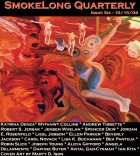We love this story about a character whose goal is only to be a better person than she is, yet finds it so unattainable. Is she really as bad a person as she thinks?
How bad is she? Well, she hasn’t splattered anybody with an (unpolished) assault weapon or mowed down any kindergarteners with her (bumper-bent) jeep. She does, however, wake up every morning with her same personality and lurch through her day with those petty and draining thoughts. I think hers is the curse of a certain kind of idealism. She could lower the bar and indulge this unappealing trait (perhaps even market it into her trademark as a talkshow personality); or she could raise her expectations and run the risk of continual failure.
Is Oona based on someone you know in real life, and if so, would she recognize herself?
Oona was inspired by a former co-worker who desperately wanted “to be seen as generous.” I use the quote here because the stunning word-choice stayed with me. Generosity did not come easily to this person; in fact, the smallest act seemed to deplete, rather than, say, to please or fortify. Plus, the emphasis on appearance seemed likely to preclude a genuine generosity, as did a certain preoccupation with rightness. So, by my prediction, this co-worker was not going to become generous, or be seen as such, in the foreseeable future. At the time, I was irritated by the stance and saw it as mere pretense; had I written the story back then, it might have been a mean, clever little thing. Fortunately, I moved on to other irritations (the world is a buffet!) and let this one soften with (much) time. Now I consider the memory a sad one, to witness a yearning for something so simple, but beyond reach. I suspect most of us disappoint ourselves in similarly facile but intractable ways. As to whether Oona would recognize herself, I’ll let you know if I get any incendiary mail after publication.
How do you feel about flash fiction versus other forms of fiction?
I’ve long had a lech for writing and reading realistic short stories of a more traditional length, but am thrilled by the challenge of concision in the flash form. (Some people are thrilled by jumping motorcycles over rows of cars…) For me, a flash fiction requires as much time (years), thought (ardor) and labor (extensive rewriting) as a story of a more traditional length and scope. Each word is important in any literary work, but some kinds of weight seem to increase as the word-count decreases. I think the most successful flash fictions pack a messy, expanding universe into a breadbox. Another, more elusive, approach is to sculpt the perfect bread crumb with all its beauty, power, symbolism and implication.
Do you have an all-time-favorite short story?
I have numerous all-time favorites because there are so many fine works in the form. Among them: “Rope” (Katherine Anne Porter); “Hunger” (Jean Rhys), “Death by Landscape” (Margaret Atwood); “Design” (Richard Bausch); “The Cove” by Gina Berriault and most short stories by my literary hero, William Trevor. If I had to pick a current favorite of the day, it would be “Seven Types of Ambiguity” (Shirley Jackson). It’s ruthless, painful and relentlessly humane.
What’s the best way to eat an Oreo cookie?
Up until recently, the best way to eat an Oreo cookie was to toss its partially-hydrogenated, artery-clogging little self into the mouth of the nearest trashcan. After the lawsuit by Ban Trans Fat and the new FDA rulings about labels, however, the manufacturer began marketing Oreos without transfat. Still, I’d probably pitch the cookie and go for a bar of plain dark chocolate from Belgium or Venezuela — cheaper in the long-run.



 The SmokeLong Grand Micro Contest (The Mikey) is now an annual competition celebrating and compensating the best micro fiction and nonfiction online.
The SmokeLong Grand Micro Contest (The Mikey) is now an annual competition celebrating and compensating the best micro fiction and nonfiction online.